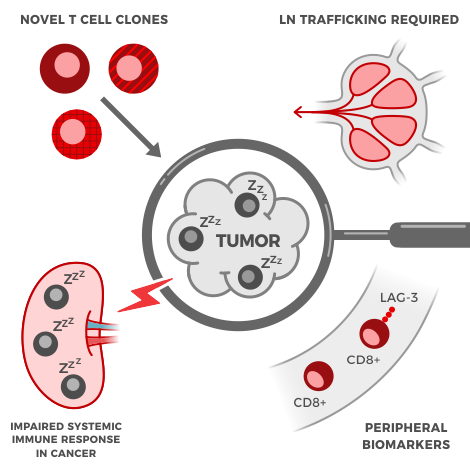The ability to predict whether a patient is worsening or recovering from an infection can greatly improve patient care and outcomes, especially for patients hospitalized with COVID-19. However, it is challenging to find robust biomarkers for COVID-19 resolution because patients recover at highly varied rates, or don’t recover at all. This varied recovery time is partly caused by the natural diversity of the underlying immune response in humans.
This varied [COVID-19] recovery time is partly caused by the natural diversity of the underlying immune response in humans.
To find conserved immune signatures related to COVID recovery, researchers at UCSF in the lab of Matthew Spitzer, Associate Professor at UCSF and co-founder of Teiko Bio, designed a CyTOF panel to detect 30 protein markers and 14 phosphorylated signaling molecules for longitudinal immune monitoring. They collected peripheral blood samples from 81 hospitalized COVID patients, 7 COVID-negative patients, and 11 healthy controls at medically-important timepoints, including hospital admission and discharge, and ventilation intubation and extubation. Using this panel, the authors found an immune trajectory across immune subsets associated with COVID recovery and subsequent hospital discharge within 30 days. The trajectory included an increase in monocytes and activated T cells, and a decrease in neutrophils and pSTAT3/pSTAT6 signaling over time.
Using this panel, the authors found an immune trajectory across immune subsets associated with COVID recovery and subsequent hospital discharge within 30 days.
The authors also looked at immune signatures associated with recovery from mechanical ventilation and found a similar decrease in pSTAT signaling, but a gradual increase in regulatory T cells, basophils and pCREB signaling. Interestingly, regulatory T cells and basophils were found in higher frequencies at the time of hospital admission in patients who would eventually end up on mechanical ventilation compared to patients who never required ventilation. These findings are consistent with the role of regulatory T cells in pulmonary repair and recovery from acute respiratory syndrome.
These data demonstrate that despite great human immunological diversity, high dimensional immune profiling through mass cytometry can be used to find conserved immune trajectories in large datasets using longitudinal monitoring. Deviations from these immune trajectories are associated with longer hospitalization and poor clinical outcomes for COVID patients.
Reference Citation: Burnett CE, Okholm TLH, Tenvooren I, Marquez DM, Tamaki S, Sandoval PM, Willmore A, The UCSF COMET Consortium, Hendrickson CM, Kangelaris KN, Langelier CR, Krummel MF, Woodruff PG, Calfee CS, Erle DJ, Ansel KM and Spitzer MH. 2022. Mass cytometry reveals a conserved immune trajectory of recovery in hospitalized COVID-19 patients. Immunity. 55: 1284-1298. doi: 10.1016/j.immuni.2022.06.004


